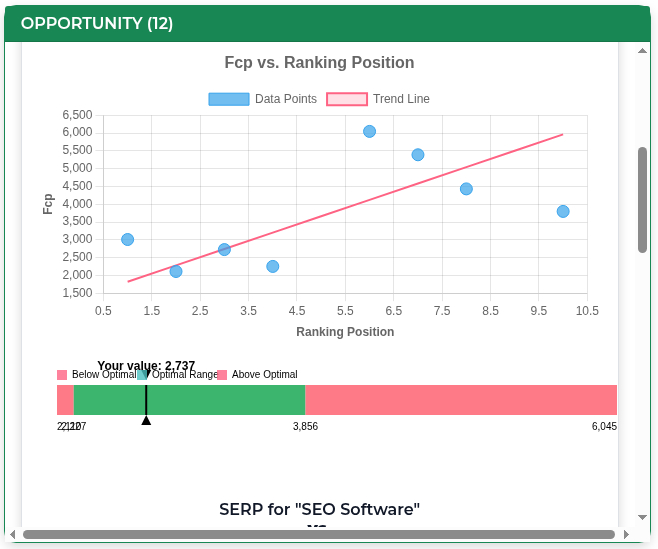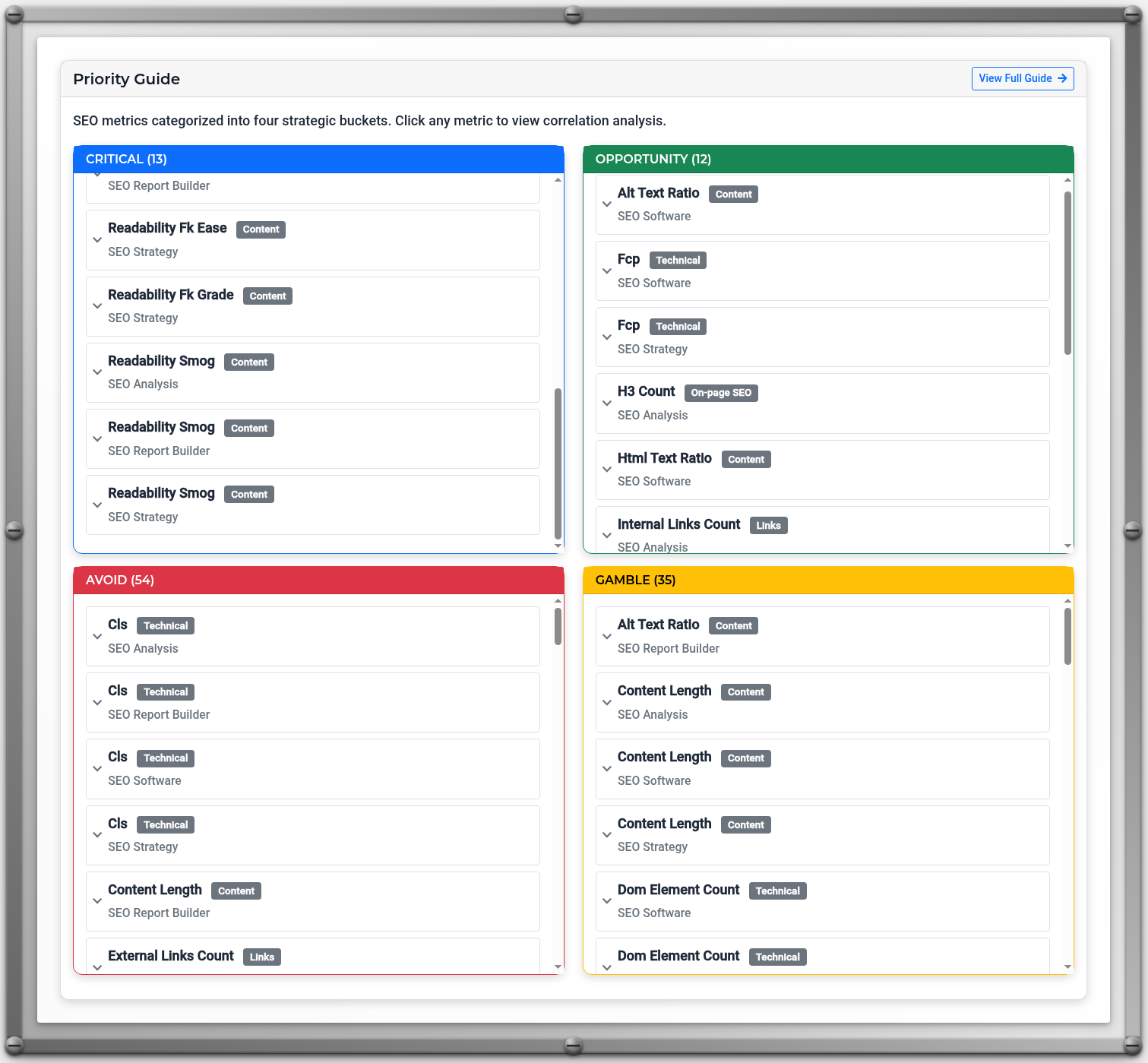Competitor Research for
SERP Analysis
See Where Your Page Stands
vs Top 10 SERP Winners
Then know exactly what to fix, what to skip, and what's wasted effort
backed by mathematical analysis of your keyword's actual ranking factors.
Available through our Competitor Research tool
analyzing what's actually ranking for your keywords right now.
Your Page
- vs -
The Top 10
See where your page ranks against the top 10 winners. The chart shows each position, the trend line, and where your page falls on the range.

Each blue dot is one of the top 10 ranking pages. The red line shows the correlation trend. The range bar shows where values cluster among winners - and where your page falls in that range.
SEO Resource Allocation
Every ranking factor sorts itself into four categories. This shows you what to prioritize, what to test, and what to skip.

What Makes This Different
You just saw how our analysis works. Other tools can't show you this because they're built on generic advice, not keyword-specific SERP analysis
Correlation Without Context
Tools show "longer content ranks better" but don't tell you if that's real or just random noise.
Guesswork Optimization
Without knowing the right range or if the data is good, you're just guessing - and hoping you're right.
"Trust Me Bro" Analysis
Most tools hide their data behind black boxes. You see their answers but never the real numbers.
Each metric pairs statistical rigor with plain-language breakdowns, so you understand both the data and what to do with it. No statistical expertise required to make confident decisions.
This tool provides the most statistically rigorous, transparent analysis of keyword-specific ranking patterns available.
It analyzes the complete top 10 population using multiple validation methods, combines data from comprehensive sources, and presents findings with full statistical context so you can make evidence-based optimization decisions instead of following generic advice.
The "correlation is not causation" objection is mathematically valid but operationally irrelevant.
Strategic resource allocation demands statistical confidence, not causal certainty.
When rigorous statistical analysis reveals solid relationships with 90%+ confidence across your keyword's SERP winners, that means actionable intelligence.
This is better than conventional SEO wisdom, regardless of whether we comprehend Google's causal architecture.
Keyword-Based Analysis That Reveals
What Actually Works
Choose your keywords, hit submit, and our Competitor Research tool analyzes the top-ranking pages to separate SEO myth from measurable reality
Algo-Change Proof Analysis
We check live search results for your keywords. We see what ranks right now, even after Google updates. No guessing, just real data.
Correlation Scoring (0-100)
Based on Pearson correlation coefficient (r), showing how strongly each factor relates to ranking position for your specific keywords.
Confidence Scoring (0-100)
Based on statistical p-value, indicating how certain we are that each relationship is real versus random chance.
Influence Scoring (0-100)
Based on linear regression analysis, measuring how much each factor actually impacts ranking changes.
Table Stakes Detection (CV < 15)
Exceptionally tight ranges across SERP winners indicate requirements rather than competitive advantages - know what's mandatory versus optional.
Technical Factors We Analyze Statistically
Never assertions, always determinations.
We go beyond simple correlation to let the SERP winners tell us what actually matters for your keywords.
We track metrics that many seasoned SEO professionals wouldn't consider valid ranking factors. The difference? Real or rumored, our tool reveals when these factors are statistically irrelevant for your specific keywords - and when they're not. Every metric shows the observed range among SERP winners, the optimal target range, and exactly where your pages stand in comparison.
This approach lets newcomers see what actually works while giving experienced SEOs hard data to support or challenge their assumptions. No factor is dismissed without measurement, and no recommendation is made without statistical backing from current SERP winners.
From Statistics to Action
Mathematical analysis translates into clear, prioritized optimization recommendations
Strategic Decision Framework
Our 3 core metrics (Correlation, Confidence, Influence) automatically sort every factor into clear buckets: what works, what doesn't, what's critical, what's a good gamble, and what you can safely ignore.
Plain Language Verdicts
Complex statistics translated into clear optimization recommendations you can actually act on.
Confidence-Based Recommendations
Critical pieces get priority. Opportunities for competitive advantage are strong secondaries, and then good gambles - high reward potential, even if less certain.
Proximity Gap Analysis
See exactly how far your pages are from statistically optimal values with numerical gap scores.
Professional-Grade Analysis Pricing
Investment in statistical certainty vs. guesswork - because serious optimization deserves serious analysis
Standard Tier
- Live SERP data collection
- 3 core metrics (Correlation, Confidence, Influence)
- Statistical significance testing
- Table stakes detection
- Page matching analysis
Premium Tier
- Everything in Standard
- Ahrefs backlink data integration
- Keyword competition metrics
- Enhanced competitor intelligence
- Premium data source correlation
Note: Match up any page on your site to see exactly where it stands in relation to the leading SERP results. Stop guessing about optimization priorities - get mathematical proof of what moves rankings.
Real Analysis Example
See how keyword-specific analysis transforms vague correlations into actionable optimization insights
Traditional SEO Tool
"Content length shows positive correlation with rankings"
Problems:
- Generic across all keywords
- No confidence measurement
- No influence quantification
- No specific target guidance
Keyword-Specific SERP Analysis
SEOLinkMap does both:
The Code making decisions: Deterministic measurement and statistical analysis
The LLM translation: Faster page loading speed is the most important factor for ranking well with "SEO Report Builder." Pages that load content quickly (measured by LCP) rank significantly better for this keyword. Your page measures 2,855ms (2.9 seconds), placing you well below the observed winner range of 3,780-13,170ms. This factor is already optimized beyond typical SERP winner performance for this keyword - direct optimization resources to other ranking factors showing gaps.
Justify Every Recommendation
Show stakeholders the raw data behind each metric so you can prove why optimization priorities matter - or why they don't
Raw Data Access
See the actual measurements from each ranking page, not just summary statistics. Prove to clients exactly why recommendations are valid.
Score Breakdown
Every Correlation, Confidence, and Influence score shows the underlying data points that generated it. No black-box calculations.
Range Evidence
Show stakeholders the exact range of values among SERP winners. Prove why targets are realistic and necessary.
Non-Factor Identification
When factors don't matter for your keywords, the data proves it. Stop wasting time on irrelevant optimizations with evidence.
Competitive Intelligence
See exactly what your ranking competitors are doing differently. Back up strategy decisions with measurable competitor data.
Requirement Proof
When tight ranges indicate mandatory factors, show the data that proves it's table stakes, not competitive advantage.
Why Mathematical SERP Analysis Wins
While competitors guess, you'll have statistically-proven optimization strategies
Replace Guesswork with Mathematical Certainty
Know exactly which factors have statistically significant impacts on rankings and which are just noise. Stop wasting time on optimization tactics that don't move the needle.
Precision-Targeted Optimization
Maximum likelihood estimation calculates optimal target values with confidence intervals. You'll know exactly what to aim for, not just "more is better."
Strategic Decision Framework
Based on correlation strength, statistical confidence, and how tightly winners cluster, we sort factors into 4 strategic buckets. No more wondering if you should optimize something.
Confidence-Weighted Decisions
Every recommendation comes with confidence levels. Critical insights get priority, competitive advantages get strong consideration, and good gambles are clearly identified.
Ready for Statistically-Proven SEO?
Stop guessing about ranking factors. Start with mathematical certainty.
The Mathematics Behind the Analysis
Understanding the statistical methods ensures you can trust the insights
Pearson Correlation Coefficients
We calculate correlation strength between ranking factors and SERP positions, providing both the coefficient value and its statistical significance.
Translation: Strong positive correlation, highly significant, large sample size
Confidence Intervals
Every correlation comes with 95% confidence intervals showing the range of likely true values, not just a single point estimate.
Translation: True correlation is between 0.52-0.78 with 95% confidence
Maximum Likelihood Estimation
Calculate the statistically optimal target value for each ranking factor based on top-performing pages in your keyword's SERP.
Translation: Target 2,847 words with 95% confidence the optimal range is 2,634-3,061
Statistical Significance Testing
Clear p-value reporting tells you when correlations are real patterns versus random noise in the data.
Translation: Only 0.3% chance this correlation is due to random chance